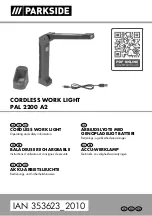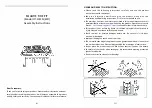
Notch
Clip
Glass Panel
Fig.1
1. Thread two headless screws (D) through the mounting plate (A), then
secure them with four lock nuts (E) (two on each side of the mounting
plate). Adjust the length of the headless screws (D) if necessary.
Note: Make sure that the headless screws are lined up
horizontally, to ensure that the fixture will be level.
2. Attach the mounting plate (A) to the outlet box by using two mounting
screws (B).
3. Gently insert glass panels into the notches, then secure them by
pressing the clips from bottom side (See Fig.1).
4. Pull out the wires and grounding wire from the outlet box. Make wire connections using the wire connector (F) as follow:
---Connect the hot wire ( usually black insulation ) from the fixture to the black wire from the power source.
---Connect the neutral wire ( usually white insulation ) from the fixture to the white wire from the power source.
---Attach the fixture grounding wire ( usually green insulation or bare wire ) to the mounting plate with the green
grounding screw (C). Then connect it to the house grounding wire with the wire connector (F).
Carefully put the wires back into the outlet box.
5. Attach the back plate to the mounting plate (A) by inserting the headless screws (D), then secure it with two rubber
pads (H) and two ball nuts (G).
CAUTION: With silicone caulking compound, caulk completely around where the back plate meets with
the wall surface to prevent water from seeping into the outlet box.
6. Install bulb (not included). See relamping label at socket area or packaging for maximum allowed wattage.
Turn on the power at fuse or circuit box
Turn on the power at fuse or circuit box
Function and Operation
MODES OF OPERATION
Choose a mode by sliding the switch on the back of the sensor. when power is first applied, the light
will turn on immediately. Wait for 100 seconds to allow the sensor to warm up.
1. TEST MODE (daytime and nighttime operation)
● The light will turn to low-level brightness (0%~50% brightness). The light will turn to high-level brightness (100%
brightness) when motion is detected, and stay on as long as the motion is continuing. The light will revert to
low-level brightness about 5 seconds after motion is no longer detected.
2. 3H MODE (nighttime operation only)
● At dusk, the light will turn to high-level brightness (100% brightness). The light will turn to low-level brightness (0%
~50% brightness) automatically after 3 hours. The light will turn to high-level brightness (100% brightness) when
motion is detected, and stay on as long as the motion is continuing. When motion is no longer detected, the light
will remain on for the predetermined time you set (5~180 seconds), and then revert to low-level brightness you set.
● Light will turn off automatically at dawn, and return to 3 H mode at dusk.
3. 6H MODE (nighttime operation only)
● At dusk, the light will turn to high-level brightness (100% brightness). The light will turn to low-level brightness (0%
~50% brightness) automatically after 6 hours. The light will turn to high-level brightness (100% brightness) when
motion is detected, and stay on as long as the motion is continuing. When motion is no longer detected, the light
will remain on for the predetermined time you set (5~180 seconds), and then revert to low-level brightness you set
● Light will turn off automatically at dawn, and return to 6 H mode at dusk.
4. 0 MODE (nighttime operation only)
● The light will turn to low level brightness (0%~50% brightness) at dusk. The light will turn to high-level brightness
(100% brightness) when motion is detected, and stay on as long as the motion is continuing. When motion is no
longer detected, the light will remain on for the predetermined time you set (5~180 seconds), and then revert to
low level brightness you set.
● Light will turn off automatically at dawn, and return to 0 H mode at dusk.
Page 2/4
180928






















